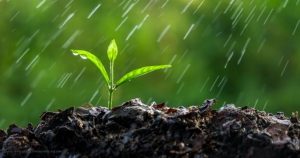Rain is one of the most beautiful gifts given to us by Mother Nature. Almost every person loves the rainy season; I am sure all of us love especially the first rain of the summer season. The sight of raindrops falling after a long summer is really beautiful, and the most beautiful things about the first rain are the ‘fragrance’ of that rain when it first hits the ground. Countless movie makers have captured the first rain in their lenses for adding quintessence to their stories. I often think as though the serene, mild and rustic smell of the earth gives out the fragrance in gratitude to the rain God after the long dry spell of weather.
I remember this famous translated poem in English from a Hebrew poetry “The first rain reminds me of the rising summer dust. The rain doesn’t remember the rain of yesteryear. A year is a trained beast with no memories”.
Yes, the smell that makes us poetic, romantic, happy seems to come from rain striking fresh soil. All of us are familiar with this smell, but why does that particular rain smell so amazing? Water itself does not have any smell, so what’s the secret behind this beautiful smell? This earthy smell is known as “Petrichor” the scent has long been chased by scientists and even perfumers for its enduring fragrance/ appeal. It is so delightful. The scent is caused by three things. One is bacteria: Soil-dwelling bacteria called actinomycetes which produce spores in the dry soil. When rain falls on these spores (a minute, typically one-celled, reproductive unit capable of giving rise to a new individual) it displaces them. The moist air carries these spores; therefore, we are able to smell them. The other reason is plants: certain plants and trees release oil that gets collected on soil and rocks. The rain causes this oil to be diffused in the air, and that sweet smell is carried to our excited noses. There is also the third reason: the Ozone layer also disperses a sweet smell of rain.
Bacteria, plants and even lightning can all play a role in the pleasant smell we experience after a thunderstorm; that of clean air and wet earth.
Petrichor – the scientific word used to describe the smell in the air after rainfall, is derived from a Greek word “petra” meaning stone and “ichor” means the fluid that flows in the veins of the gods in Greek mythology. This phenomenon was first characterized by two Australian scientists in 1964, when their article was published and gave an explanation about the cause of the smell. According to them, plants exude some natural oil and these oils mix with the surrounding soil, where they are stored until the next rainfall. When rain mixes with the dry dirt, these oils are released into the atmosphere. And at the same time a chemical compound found in the soil known as ‘geosmin’ also stimulated up by falling rain.
Do you know that Petrichor translated as ‘Mitti attar’ (translated as fragrance of mud in HIndi) is produced using clay extracted from the topsoil and baked in a kiln (furnace)? This is produced in Kannauj – famously known as perfume capital of India — Kannauj is in Uttar Pradesh. A century-old process is used to recreate that earthy smell of the first shower. The scent is used in shampoos and bath soaps also.
Some scientists have observed that the Petrichor scent is associated with the color green, suggesting the deep-seated link between a season’s first rain and the expectation of growth of the nature. The first rain and its earthy scent have positive association rooted in the mankind’s collective consciousness around the world. After all, the plants, creatures, rivers, ponds all long for the rainfall. The next time you relish the scent of fresh rain; remember that it is a cultural identification derived from few centuries, from our ancestors.a














































